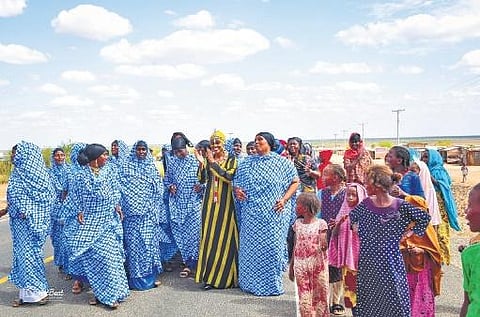

KOCHI: Anna Qabale Duba was born in a pastoralist community in a small village in Kenya called Torbi inside Marsabit County, the second largest county in the country. And for every small to large achievement in her life, she always had to go the extra mile.
She was subjected to ‘the cut’ female genital mutilation at 12 years and narrowly escaped forced marriage at the age of 14. Anna’s life was nothing short of a fight for survival. Finally, battling against many odds, Anna became the first graduate from her village and the only educated girl in her family.
“I am from a polygamous family. I have three mothers and 19 siblings. And I am the only girl in the family who has passed primary school,” she says. She never put a stop to her ambitions and completed Bachelor of Science in Nursing from Kenya Methodist University and Master of Science in Field Epidemiology from Moi University.
The Kenyan nurse was in Kochi recently after winning the Aster Guardians Global Nursing Award, carrying a cash prize of $250,000. Anna is now busy inspiring others from her country. She has started a community Qabale Duba Foundation that champions the right of girls and women in Northern Kenya, especially in the field of education. Started in 2014, the foundation donates sanitary pads and also teaches parents about key sexual and reproductive health issues.
“The award is a stepping stone for my foundation and the activities on the plan, in terms of education, healthcare, and giving a wider perspective altogether,” says Anna. “I came across the Aster Guardians Global Nursing Award on Facebook. I wrote my story, got shortlisted and won out of the 24,000 applicants. With the award money I can build the entire school now,” she proudly exclaims.
She is speaking about her school, Torbi Pioneer Academy. The ‘school’ was a classroom of four students initially. Now, there are around 175 students and 60 adult learners. The school follows a unique model, the children study in the morning and adults come in for the classes in the afternoon.
“I started the school to break illiteracy because it held back people from learning new things. The high illiteracy level makes it difficult to change people’s regressive mindsets,” says Anna. Needless to say, getting an education was a challenge for Anna as well. She grew up witnessing several men in her village getting degrees. That led her to believe education was just for boys.
“Even if girls are sent to school, it’d be just primary level. After that, they’ll drop out and get married. I was lucky that my parents sent me to school. When I realised how education helped open unimaginable opportunities, I wanted to go back home and give back to the people. That’s how I came up with the school,” says Anna.
Anna was also once on the verge of dropping out of school due to a marriage proposal. “I had to raise an alarm to my mother and school teachers so that I could continue my education. I was just 14 at the time. Child marriage and discontinuing education still go on in many rural villages. Change is happening though. A considerable number of girls is now getting school education,” says Anna.
“The foundation makes sure that the girls get to go to school. By the time they finish school, they’ll be 18. At least like this, we are delaying the process of early marriage.”
A violent tradition
“I underwent it at the age of 12,” says Anna about female genital mutilation (FGM). It is a practice deeply rooted in cultural traditions in many parts of the world. According to World Health Organisation, FGM involves the partial or total removal of external female genitalia for non-medical reasons, and the practice has no health benefits, whatsoever.
“I realised the practice is harmful after becoming a nurse. I understood that the women had to struggle a lot while delivering,” says Anna. In Kenya, FGM is also seen as a rite of passage. The Kenya Demographic and Health Survey found that 21% of women aged 15-49 in 2014 have undergone the painful process.
As part of her initiatives in bringing a change to the horrific practice, Anna aims to educate men on FGM. “A lot of families fear that if a girl doesn’t undergo it, men wouldn’t be willing to marry them. It’s high time that men knew about the dangers of this practice,” says Anna.
The Qabale Duba Foundation also advocates safe motherhood. “The community I come from lacks health facilities. Women often deliver at home. We encourage women to get antenatal care,” she says.
Anna is now a nurse stationed at the Kenya Marsabit County Referral Hospital. She has also won several accolades including the Global Citizen Award in New York. She was also the former Miss Tourism Kenya and ranked among the top 100 most influential young Africans in 2020.